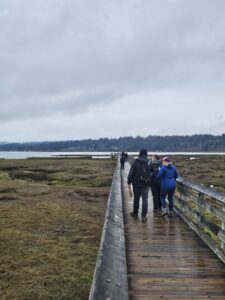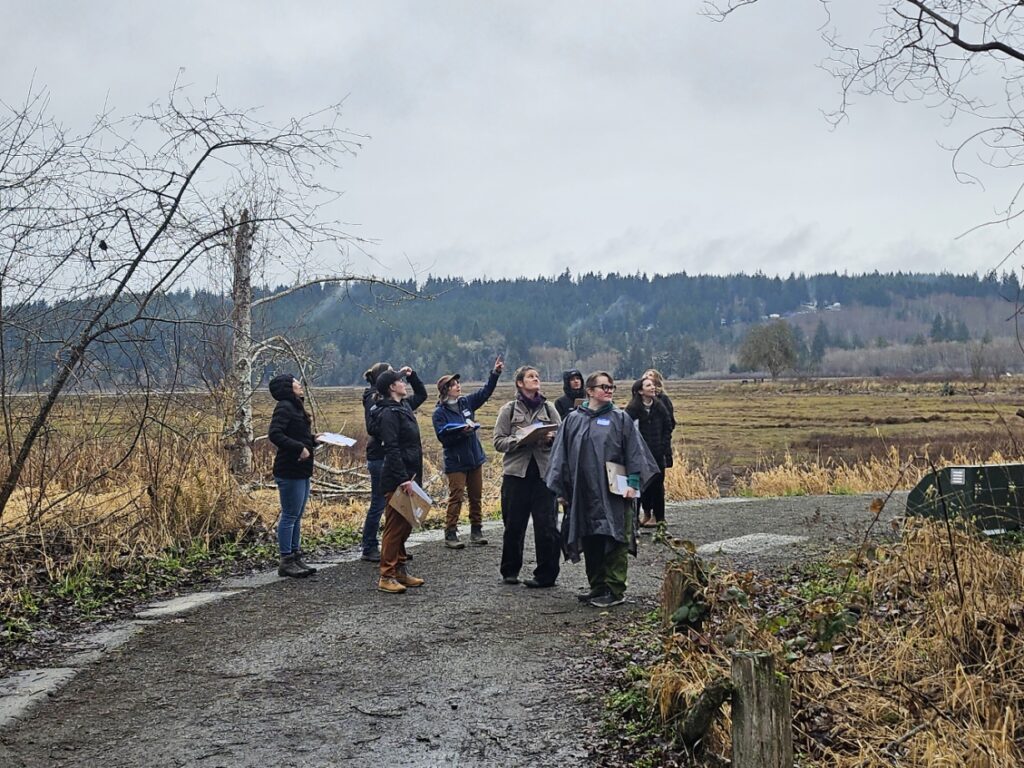March 8th may have marked a turning point for community involvement with Theler Wetlands. For years, the Theler Wetlands Environmental Education Center served as a resource for educators and visitors in Belfair and surrounding areas. Located on 150 acres of wetlands at the tail end of Hood Canal, the center offered classes, an interpretive center and a classroom for high school students in North Mason School District, which holds the site in trust.
Then things went dormant. The center still existed but lacked volunteers. Teachers would do occasional classes and bring their students to the wetlands for salmon release events, but otherwise, the site remained unused.
But on March 6th and 8th, Hood Canal Salmon Enhancement Group (HCSEG) and PEI teamed up to offer a two-part workshop reintroducing regional teachers to the wetlands and the former environmental education center.
“The idea of this workshop was for educators to start using the Theler Center, classroom and Wetland trails for field trips again, because it’s this great education site,” says PEI’s South Sound FieldSTEM Coordinator Lauren Troyer. “It has a room of exhibits and installations that has been shuttered for years and it’s in disrepair. The Salmon Center is adopting it and hoping to restore the exhibit for the public to come in and again have access to all this great learning.”
“I felt as though I learned so much today. We already have a field trip planned and I’m excited to implement these ideas.”
— Workshop Participant
The workshop was funded through an Environmental Protection Agency (EPA) grant to HCSEG that includes education and outreach efforts. “The Salmon Center is nearby at the mouth of the Union River and

they do incredibly robust environmental education, offering community gardens, a farm, K12 salmon education, camps, and a dog park” says Troyer. “The EPA grant supported bringing teachers to Theler to work with Salmon Center staff and build everyone’s capacity to start offering field trips and field experiences there.”
Twenty-two teachers from North Mason, Pioneer, Grapeview, Hood Canal and Shelton School Districts attended a two-hour online session on a Thursday evening followed by a three-hour in-person event at Theler Wetlands. The group contained a variety of experience levels with the site and the host organizations. “Some had been to the wetlands before, or attended a PEI workshop but others had not,” says PEI’s Mid-Sound FieldSTEM Coordinator Daniel Cuevas. “We had such a diverse spread of activities and content during the in-person session that there was probably something new for everyone.”
During the online portion, they learned about the history of Theler, explored resources and considered ways they might use them with students during a visit.
The in-person session began with a discussion of the Skokomish Tribe’s connection to the wetland. Then HCFEG’s Stewardship Coordinator Adrian Nevarez explained the history behind the Washington Department of Fish & Wildlife (WDFW) and HCFEG’s efforts to restore the estuary.
During the second half of the morning, teachers rotated between four stations. PEI’s Mid-Sound FieldSTEM Coordinator Daniel Cuevas led them through a twig survey, Troyer led a plant teachings and identification station, HCSEG Education & Outreach Coordinator Whitney McDaniel guided a wetland walk, and Nevarez ran a plant removal and restoration station. At the end, the group had time to plan field experiences for their students.
“I was really impressed with the stations and the materials provided to look through,” reported one participant in a post-workshop evaluation. “I am very excited to share what I learned.”
“I felt as though I learned so much today,” said another. “We already have a field trip planned and I’m excited to implement these ideas.
Another workshop is planned for next year through the EPA grant, which also funds $5,000 per district to pay for transportation and substitute fees during field experiences. Already, several teachers have brought their students to Theler Wetlands while others have committed to do the same. “Nearly every target district has signed up to bring students,” says Troyer. “They were very happy and interested in learning about more opportunities and programming.”
